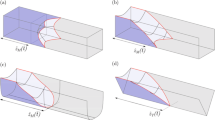Abstract
THE temperature profile in an essentially Newtonian liquid in laminar flow in a capillary has been measured experimentally. Previously the phenomenon of capillary heating (that is, heat produced by the internal friction of liquids in flow in a capillary) had been the subject of extensive theoretical treatment1,2; but with little experimental verification. These experiments show that the system is essentially adiabatic, in contradiction to widespread belief that the ‘isothermal wall’ condition existed.
This is a preview of subscription content, access via your institution
Access options
Subscribe to this journal
Receive 51 print issues and online access
$199.00 per year
only $3.90 per issue
Buy this article
- Purchase on Springer Link
- Instant access to full article PDF
Prices may be subject to local taxes which are calculated during checkout
Similar content being viewed by others
References
Brinkman, H. C., App. Sci. Res., A, 2, 120 (1951).
Bird, R. B., Soc. Plastics Eng. J., 11, 7 (1955).
Author information
Authors and Affiliations
Rights and permissions
About this article
Cite this article
GERRARD, J., APPELDOORN, J. & PHILIPPOFF, W. Heating in Capillary Flow. Nature 194, 1067–1068 (1962). https://doi.org/10.1038/1941067b0
Issue Date:
DOI: https://doi.org/10.1038/1941067b0
This article is cited by
-
A calorimetric measurement of frictional heat in capillary rheometry of polymer melts
Rheologica Acta (1973)
-
Viscous heating in coaxial cylinder viscometers
Rheologica Acta (1967)
-
Effects of viscous dissipation on heat transfer parameters for flow between parallel plates
Zeitschrift für angewandte Mathematik und Physik ZAMP (1965)
Comments
By submitting a comment you agree to abide by our Terms and Community Guidelines. If you find something abusive or that does not comply with our terms or guidelines please flag it as inappropriate.



